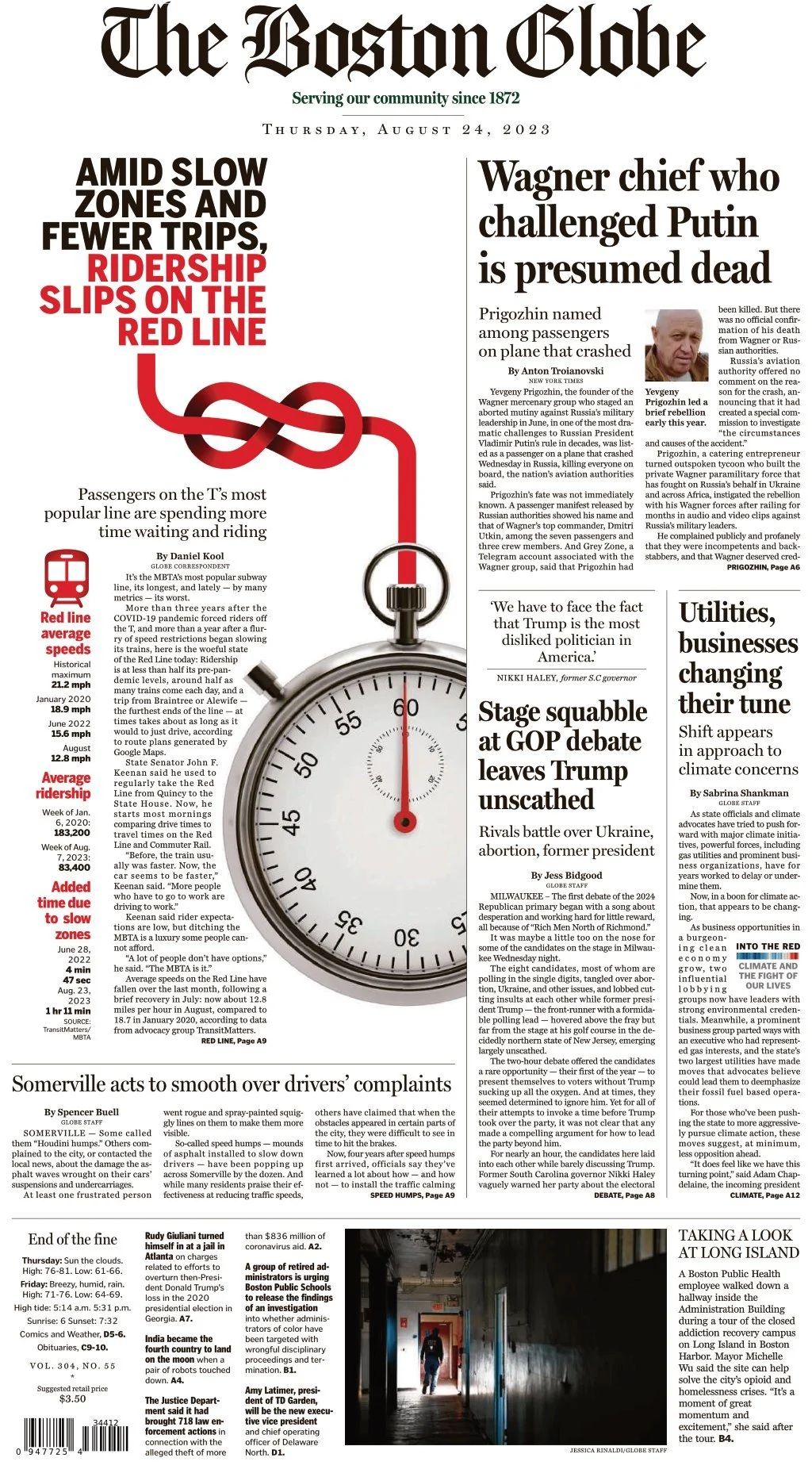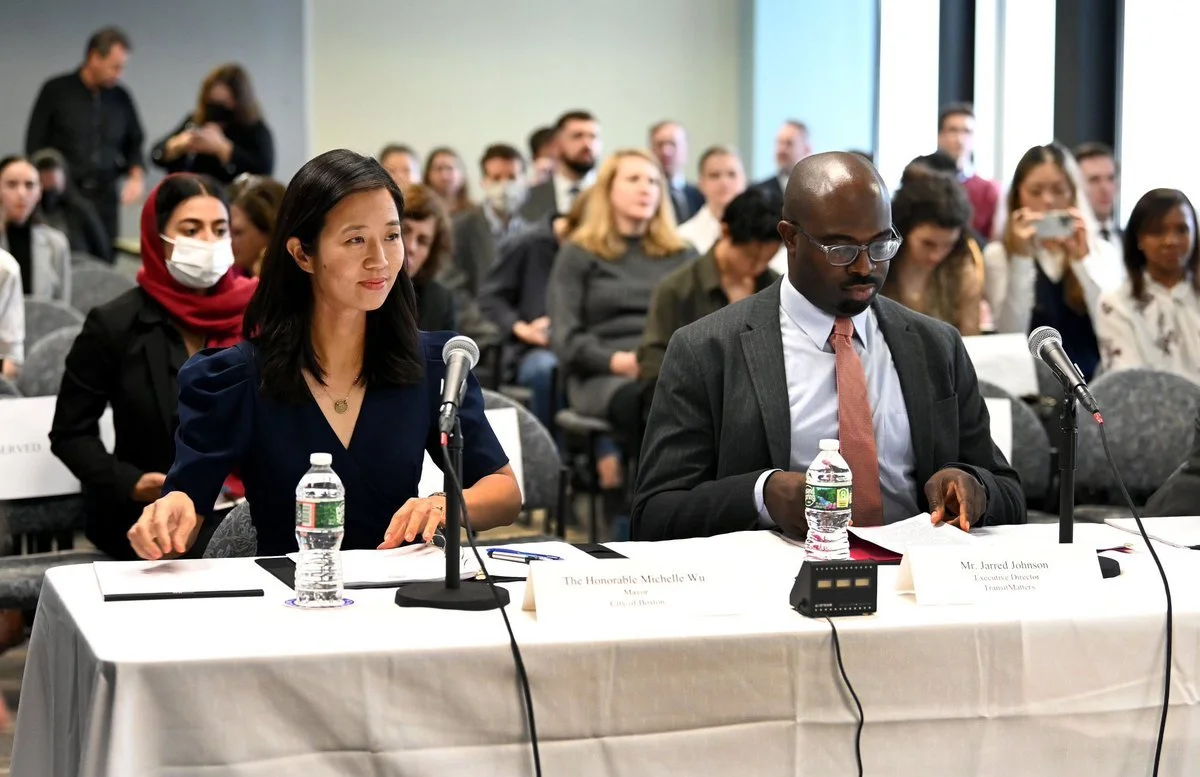If you ride it, you know. The Red Line is the worst. Just look at the stats.
Average speeds on the Red Line have fallen over the last month, following a brief recovery in July: now about 12.8 miles per hour in August, compared to 18.7 in January 2020, according to data from advocacy group TransitMatters.
And riders say they can feel it.
Daniel Kool | The Boston Globe
Daniel Kool | The Boston Globe
“Reduced ridership and fewer total trips have coincided with decreased speeds, data show. In late June 2022, prior to the July slowdowns, Red Line weekday ridership topped 100,000 trips on average, with nearly 200 roundtrips completed each day, according to TransitMatters.
Last week the T scheduled an average of 127 Red Line trips each day and completed 104 of them. Meanwhile, weekday ridership fell to about 83,000 this month, according to TransitMatters. The advocacy group measures ridership in terms of the total number of validated fares, which does not include transfers.
The T’s metrics, which include transfers, show a loss of about half the Red Line’s pre-pandemic ridership.
It’s a far cry from the T’s vision in the 1970s and ‘80s, when the Red Line was extended in each direction, south to Braintree and north to Alewife.”
Orange Line delays are the shortest they’ve been since 2019, transit group says
While conditions have improved on the Orange Line, Red Line riders have seen mounting delays in recent months.
Abby Patkin | Boston.com
While conditions have improved on the Orange Line, Red Line riders have seen mounting delays in recent months.
Abby Patkin | Boston.com
Good news for Orange Line riders: Delays on the line are now the shortest they’ve been since 2019, according to data from public transportation advocacy group TransitMatters.
The total delay from slow zones is down to 0.28 minutes—a little less than 17 seconds—and has been since last Thursday, per TransitMatters data. Delays hit a peak of nearly 27 minutes when the Orange Line first came back online in September following a 30-day shutdown for much-needed repairs.
As of Monday, the median travel time for a ride from Oak Grove to Forest Hills was slightly more than 36 minutes.
‘Based on our data, this is almost the fastest it’s ever been,’ Seth Kaplan, a software engineer and volunteer on TransitMatters’ lab team, told The Boston Globe. ‘It’s promising.’”
Senator Ed Markey Cites TransitMatters Data at Senate Subcommittee Hearing, October 2022
On October 14, 2022, TransitMatters Executive Director Jarred Johnson testified with Mayor Wu at the Senate Committee on Banking, Housing and Urban Affairs’ Subcommittee on Economic Policy hearing.
“On October 14, 2022, TransitMatters Executive Director Jarred Johnson testified with Mayor Wu at the Senate Committee on Banking, Housing and Urban Affairs’ Subcommittee on Economic Policy hearing in Boston about management failures within the Massachusetts Bay Transit Authority.”
The shutdown was supposed to make the Orange Line faster. It’s slower, data show.
If the Orange Line feels slower to you than before the shutdown, you’re not imagining it.
Taylor Dolven | The Boston Globe
Taylor Dolven | The Boston Globe
“If the Orange Line feels slower to you than before the shutdown, you’re not imagining it.
Despite repeated promises from the MBTA of faster travel times, the Orange Line has been running slower this week than before the agency shut down the entire line for 30 days to make repairs, data show.
Before the repairs, it took about 40 to 45 minutes to travel from one end of the Orange Line to the other, depending on the direction, according to MBTA travel time data analyzed by TransitMatters, a public transportation advocacy group.
This week, it took as long as 48 minutes in either direction to cover the same ground.”


